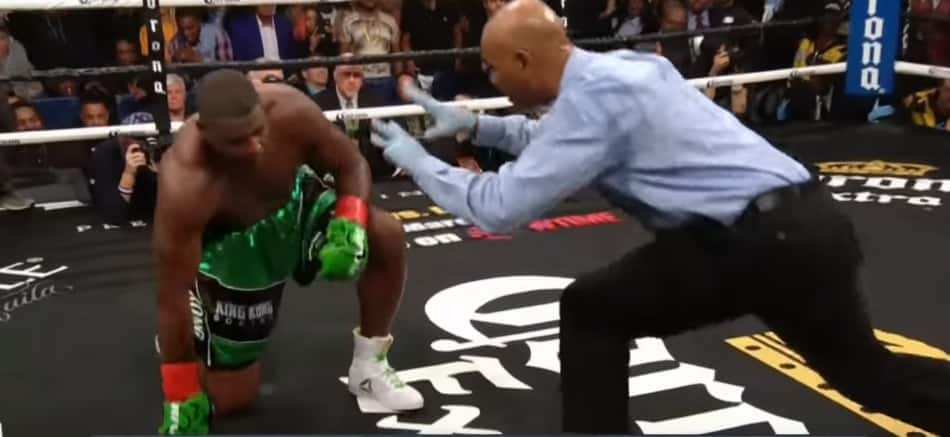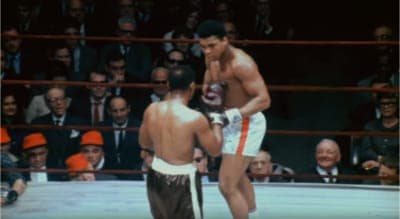
One of the first things that a beginner at boxing learns is that you will get hit … a lot.
And to be able to sustain the hits that will land during training or a fighting match, you have to learn how to deal with the pain at the moment and the aftermath of it.
How do boxers deal with pain? A lot of the pain during training and fighting can be mental. Experienced boxers deal with pain better because they understand the implications of the different punches. They don’t panic and can react intelligently in such a way as to have the physical pain wear off and not get hurt even more in the meantime.
A boxer can be hit around the whole upper body – jaw, nose, solar plexus, liver, kidneys, thighs, and so on. Each hit can inflict not just a pain, but automated reactions from the body and altered psychological state.
During a fight, the actual pain is the least of the issues that a boxer has. The body reactions and the psychological changes should be kept under control, too – and this is the thing that many boxers learn to cope with every single day. But for a beginner – dealing with the pain after a hit might be the tricky part. After all, it should be kept under control in order to proceed with the training or the fight. This is the thing that we will discuss in this article.
What is happening when you take a hit?
Several different things can happen almost simultaneously. And I would like to take a more in-depth look into them as this is an important factor in any boxing match.
1. Body Reflexes
Let us take for instance a punch to the eye while fighting or training. In the same split second, when you realize that you will receive a punch to the eye, you will close your eyelids – this is an automated body reflex. Upon receiving the hit, your head will flinch to the back, and again as a reflex, you will raise your hands to cover your eyes and guard your head towards further punches.
About the reflexes – every single human being has them, so there is not much that you can do about that. Just remember – everything that comes close to your eyes as it is in this example will trigger your reflexes.
- The danger here lies in the fact that (especially for beginners) you will instantly close your eyes or do weird body or hand movements to protect yourself, which often are not the best thing to do. For instance, closing your eyes even for a split second will give your opponent time to use that brief moment of you not seeing him and land another hit, or moving your arms as a reflex to protect yourself might leave you open for other punches.
2. The Physical Reactions
Now you took a punch to the eye, but there is nothing to worry about because it is protected by your eye socket. The flinch of your head reduces the force of the incoming hit, so does the eye socket. The result for you will be a bad bruise, but not a loss of an eye or anything really terrible.
There, you took a hit like a champion.
But what now?
You have to be prepared for the physical reaction of your body. You will feel that in a second after the hit. Your eyes will start watering, yes – even the eye that was not punched.
It will feel like crying, but it is not the same. After that, your nose will start to run. For a couple of seconds, you will see stars, mostly with the eye that was hit. Because of the water and the hit, you will not be able to focus well. The other eye might be blurry too.
The next thing that you will feel is the pressure of the water and the blood that is rushing into the punched area – this is called inflammation.
Depending on the hit and its force – you might feel very dizzy or even lose your balance. Also after taking the punch and continuing with the training or the fight – in the next couple of weeks, you will be left with a bad painful bruise.
Given this example, you now know how your body will react. There will be a pain of course, but because of the adrenaline levels – you probably will not feel it at all or just for the first couple of seconds. If you took the hit and can stand on your feet – you can continue the match. But to do that you will have to ignore the pain, and for a beginner, it is not always easy to just forget about it.
- The danger here lies that you need to be prepared for the aftermath. For everyone new to boxing, even the slightest of punches can seem to bring a lot of pain, but it is something that the body gets used to.
3. The Psychological Reactions
If you managed to handle everything so far, you should be prepared for the next thing – the psychological factor. When you receive a punch the next thing that you might start feeling is panic and fear.
The nervous system of your body will trigger that response, and your respiration and heart rate will go up. The adrenaline might make your body shake, and might become less precise in your movements and punches – and you could expect a tunnel vision.
And all of this just from receiving one punch to the eye…
The overall result in this scenario would be temporary disorientation, inability to fight back, and inability to control your emotions and thoughts. As soon as you realize all of this – the sooner you will learn how to deal with the pain and your body and mind reactions and continue the training or the fight.
- For everyone just starting with boxing, the first fights will be super scary simply because you don’t really know what yo expect; you don’t feel confident that you can protect yourself or land a good hit. Often a punch will feel super heavy, and you can get scared, but with the time you can better understand which hits are more dangerous and which are not.
The mental side of the pain
The truth is that the professional boxers were hit so many times that they know everything that will happen with their bodies and their mind after every punch. They have a better knowledge of which hits they can take and which are to be avoided at all cost. They know how much will be the pain and of course – how to proceed without quitting.
As a boxer, you should know something – getting hit and experiencing pain is not the end of the world.
This is something usual for every fighter and should be expected every time – at practice and when fighting. The pain or being punched should not shock you or catch you off by surprise. You will take some hits, so learn how to deal with the reactions of your body and mind and of course – accept the pain and learn how to continue with it. But most important of all – know your limits, know when to say, “I’ve had enough.”
You should be able to stay in control and make the same quick and intelligent decisions while avoiding further hits and damage.
Do not think about the pain nor the bruises – you will have some after every fight, but they are not that painful. And if the pain is that big, you can always seek medical attention.
Long story short – if you want to be a good boxer, you should keep your mind under control. Everything is mental, even the pain at some moments.
How to deal with the pain after training and fighting?
If you are in pain after training or a fight, but it is not that bad to see a doctor or to use painkillers, you can try the following things, depending on the type of pain.
1. Soreness
- Gently massage the sore areas;
- Take warm baths;
- Stretch gently and carefully, and always do your warm-ups.
- Give yourself enough time to recover, eat plenty, and have a good rest.
2. Small injuries
- Immediately after the injury apply something cold on the areas– ice pack would be a great option;
- The next day apply something warm on the areas – you can fill a zip-lock bag with some warm water and cover it with a towel;
- Take some anti-inflammatory medications – you can start with them right after getting the injury.
3. Training pain
The pain during training might be from hard stretching or because you are forcing your muscles too hard.
To dampen the pain, you can try to breathe slowly and deeply – this way, your brain will start releasing endorphins.
Of course, if the pain is too big – you can stop training and give yourself some rest. But in most cases to deal with it, you should just keep training regularly – that way your pain threshold will improve over time, and you will be able to overcome more and more pain and of course your body will strengthen as well.
4. Severe injuries
If you suffer from an acute injury – the first thing that you should do is to visit a physician or another medical specialist.
That way, you will get checked in and of course, will get the necessary medication and therapy and will be up and running again in no time, because the physicians know how important it is for an athlete to go back to training.
Don’t make the frequent mistake of pushing through the pain. The “No pain, no gain,” attitude will not get you far, so put safety in the first place.
Tips on dealing with the pain for beginners
- You don’t need the “tough guy” mentality – When you spar with someone better than you, chances are it will hurt. So don’t hesitate to ask them to don’t go hard on you. Also if you take a hard shot call a timeout and take your time to recover. You can even consider doing no more sparring in that day.
- The nose and the liver – Punches in those two spots will most likely hurt the most. So keep your chin tucked in and your right elbow down, to your body. That way you’ll protect your nose and your liver
- Take your time off after an injury – Training with injuries can worsen them. So take your time to recover before starting training again. If it’s a small injury you can still do light drills such as shadowboxing, speedbag or work on your cardio.



